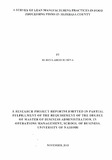| dc.description.abstract | For high performance, a company has to either increase its revenues or reduce costs.
Whilst increasing revenues remains a challenge from uncontrollable factors such as local
and global competitive forces, organizations must consider reducing costs. One major
cost reduction activities is elimination of wastages. This has called for the necessity in
adopting lean manufacturing practices. The research surveyed the adoption of lean
practices in food processing firms in Mombasa county. The study was designed with aim
of achieving three objectives: to determine the extent to which lean manufacturing
practices have been adopted by food processing firms, to establish the benefits of lean
manufacturing by food processing firms and to establish the challenges faced by food
processing firms in Mombasa County in implementing lean manufacturing. The data
analyzed was gathered using semi-structured questionnaire targeting production
managers of manufacturing firms in Mombasa. The results were presented using tables,
percentages, rank ordering, mean scores, frequencies and charts for ease of
understanding. The findings indicated that most food processing firms belong to bakers &
millers with more than 200 employees. It is also clear that the companies have
implemented various tools and principles to support lean production and improved their
operational performance. The results also show that most firms use unit cost of product
relative to competitor to measure their performance. Companies are found to have a good
understanding of lean production, and since its implementation, they have gained many
benefits such as increase in revenues with no increase in costs, reduction in waste of
excessive in-process inventories and increase visibility of both product and quality
problems, improve system efficiency and on-time delivery. Even though most food
processing firms have benefited from adopting lean production it was found that the most
experienced challenge was resistance to change. Limit of creativity and innovations,
customer dissatisfaction and wrong implementation sequence of lean concept were
among the other challenges experienced. The study recommends more awareness of the
role of lean practices not only in the food processing sector but also others such as the
service sector. In addition, the study also recommends that top management commitment
is crucial in the successful adoption of lean practices. | en_US |

